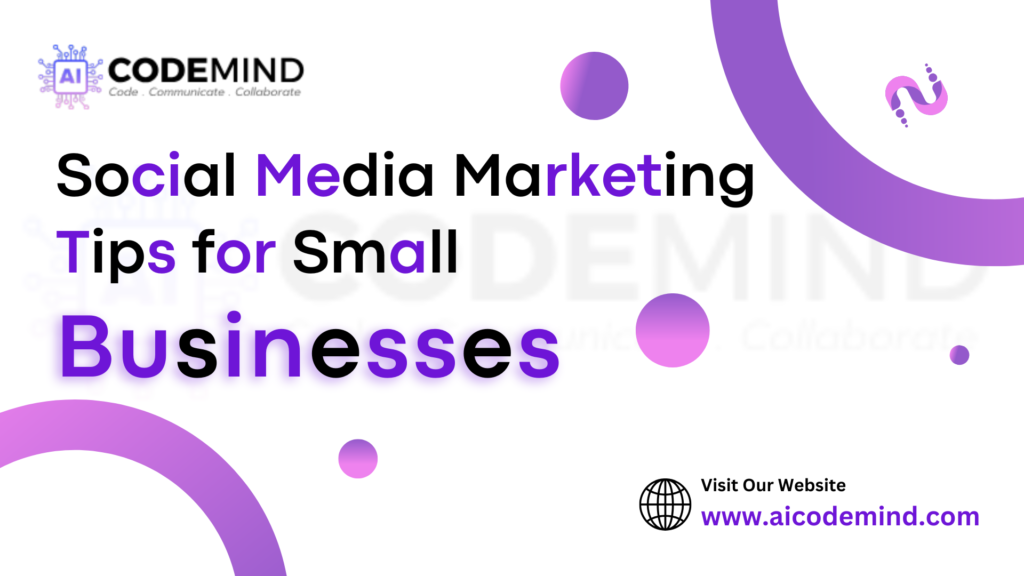Social Media Marketing Tips for Small Businesses by AIcodemind


In today’s digital landscape, social media marketing is essential for small businesses looking to build their brand, engage with customers, and grow their audience. With the right strategies, even small businesses can compete with larger brands. Here, AIcodemind shares practical tips to help you make the most of social media marketing, no matter the size of your budget.
1. Choose the Right Platforms
Each social media platform has a unique audience and purpose. As a small business, it’s crucial to focus on the platforms that align with your goals and where your target audience is most active. Here’s a quick breakdown:
- Facebook: Great for reaching a broad demographic and sharing various content types.
- Instagram: Ideal for visual businesses, such as retail, hospitality, or lifestyle brands.
- Twitter: Perfect for real-time updates and engaging with trending topics.
- LinkedIn: Suited for B2B marketing and professional services.
- Pinterest: Excellent for businesses with highly visual products, like fashion or home decor.
2. Set Clear Goals
Define what you want to achieve with social media. Goals could include increasing brand awareness, driving website traffic, boosting sales, or improving customer service. Setting SMART goals—specific, measurable, achievable, relevant, and time-bound—helps you stay focused and measure your success.
3. Know Your Audience
Understanding your target audience is key to creating content that resonates. Conduct research on your ideal customer’s demographics, interests, and online behavior. Tools like Facebook Insights and Instagram Insights can help you get to know your followers better and refine your strategy based on the data.
4. Create High-Quality Content
Quality content captures attention and encourages engagement. Here’s what you can do:
- Use high-quality images and videos to make posts visually appealing.
- Be consistent with your branding by using similar colors, fonts, and messaging.
- Tell stories that connect with your audience on a personal level.
- Experiment with content types such as infographics, user-generated content, product showcases, and behind-the-scenes looks.
5. Engage with Your Audience
Social media is a two-way street. Encourage engagement by responding to comments, answering questions, and joining conversations. Try the following strategies:
- Ask questions or create polls to get input from your audience.
- Reply to messages and comments promptly to show that you care about customer experience.
- Host giveaways or contests to encourage people to like, share, and follow your page.
6. Leverage Hashtags
Hashtags are a great way to increase your content’s reach, especially on Instagram and Twitter. Use relevant hashtags that align with your industry, but avoid overloading your posts. Research popular hashtags in your niche and create a few branded hashtags unique to your business.
7. Post Consistently
Consistency is key to maintaining engagement and building brand recognition. Create a content calendar to plan posts in advance, and use tools like Buffer, Hootsuite, or Later to schedule them. Aim for regular posting but prioritize quality over quantity.
8. Use Paid Advertising Strategically
With a small budget, paid advertising on social media can be a cost-effective way to reach a larger audience. Here’s how to start:
- Boost top-performing posts to reach a broader audience.
- Use targeted ads to reach specific demographics.
- Experiment with ad formats, such as carousel ads, video ads, or story ads, to find what works best for your business.
9. Collaborate with Influencers and Brand Ambassadors
Even with a limited budget, small businesses can work with micro-influencers who have smaller but highly engaged audiences. Micro-influencers are often more affordable and can provide authentic endorsements that resonate with their followers. Partnering with influencers in your industry can help you reach new audiences and build credibility.
10. Track Your Performance
To know what’s working and what’s not, it’s essential to track your social media performance. Review metrics like engagement rate, reach, clicks, and conversions to understand your audience’s preferences. Use analytics tools available on each platform or third-party tools like Google Analytics to see how social media drives traffic to your website.
Conclusion
Social media marketing can be a game-changer for small businesses. By selecting the right platforms, creating valuable content, engaging with your audience, and using data to refine your approach, you can build a loyal following and grow your brand. With consistency and creativity, social media can help your business thrive in today’s competitive market.
For help with social media strategy, feel free to contact AIcodemind. We’re here to help you make the most of social media and boost your business success.






